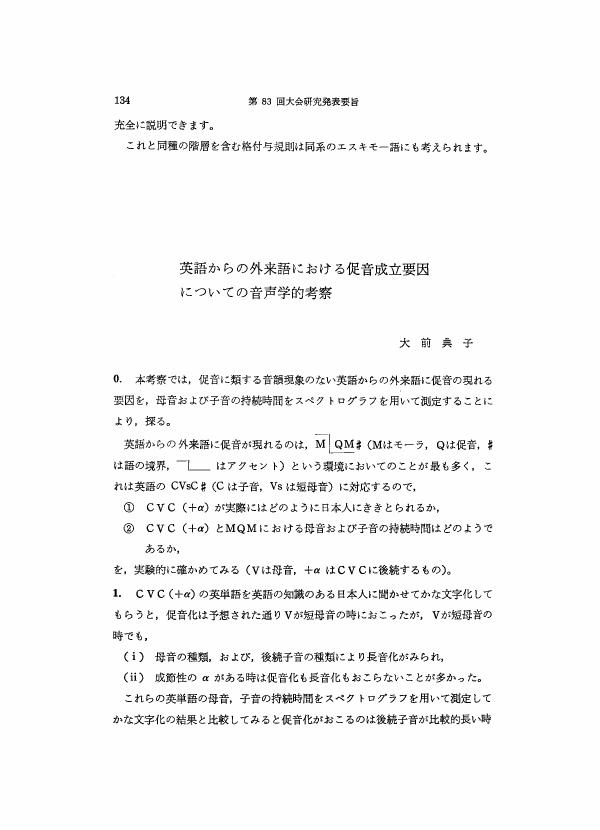8 0 0 0 IR 音楽の記譜法の合理化と時間をめぐる考察
- 著者
- 寺前 典子
- 出版者
- 慶應義塾大学大学院社会学研究科
- 雑誌
- 慶應義塾大学大学院社会学研究科紀要 : 社会学・心理学・教育学 : 人間と社会の探究 (ISSN:0912456X)
- 巻号頁・発行日
- no.74, pp.19-32, 2012
論文Classical music, which is western ethnic music from one among several periods in the history of music, has had a greater impact than other kinds of music. According to Weber, one reasons for its impact is the rationalization of notation. Why has the West invented rationalized notation?This study examines Weber's studies of notation to investigate this issue, relating societal time consciousness to rationalizations of notation on the basis of Schutz and Husserl's theories.According to Schutz, people connect with others through a "mutual tuning-in relationship" that underpins all communication to form not only face-to-face relationships but also quasi-simultaneity that is separated by hundreds of years via music. First, this study analyzes the notation of Japanese traditional music in terms of quasi-simultaneity. Further, it describes the process of development of societal time consciousness in the West—from the Roman to the Gregorian calendar and Greenwich Mean Time—and western music's process for rationalization of notation—from neumatic to modern notations. The study finds a parallel relationship between both processes, which are eventually connected by the invention of the metronome. Maki asserted that activities in modern society must be controlled by "universal time," which in western music means the note that represents abstract time and the beat of modern notation. Husserl philosophically analyzed processes of consciousness in inner time expressed in his time chart. This study also analyzes people's processes of consciousness in a musical environment by collectively using a time chart and notation and identifies the distinctions as well as limitations of universal time. Elias took a contrary position and noted that humankind develops ideas through experience and learning. This study demonstrates that philosophical approaches are effective in sociologically explaining time.These analyses explain why rationalized notation has been invented in the West. Such notation satisfied the societal demand of connecting people in quasi-simultaneity by abstracting time, as it represents the process of developing societal time consciousness.
8 0 0 0 IR 楽器と音律の合理化における〈身体感覚〉の変遷--マックス・ウェーバー音楽論再考
- 著者
- 寺前 典子
- 出版者
- 慶應義塾大学大学院社会学研究科
- 雑誌
- 慶應義塾大学大学院社会学研究科紀要 (ISSN:0912456X)
- 巻号頁・発行日
- no.70, pp.73-90, 2010
論文Music has been thriving to be the site of an endless competition between two aspects of human beings; a rational (mechanical) aspect and an aspect that cannot be determined by rationality (sensible). In Max Weber's The Sociology of Music: The Rational and Social Foundations of Music, he contrasts rationalizations of many kinds of ethnic, ancient, and modern music to western classical music, concerning what had brought modern western classical music to fruition. Weber concludes that the piano is a successful form of a rationalization of keyboards in western classical music.This study is concerned with the rationalizations of instruments and temperaments through two contrasting aspects; a rational aspect would be a mechanical aspect, while an aspect which cannot be determined by rationality would be a "human sense." Most musical instruments that are used in western classical music have experienced structural rationalizations such as that of the piano. In terms of the construction of the instruments, the flute in particular has been employing the equal temperament and has changed a scientific instrument that is prior to a mechanical aspect just like the piano. On the other hand, in terms of performance, the flute has kept its pure intonation that is based on the "human sense," contrasting to the piano whose tones have deteriorated because of rationalization. Consequently, this paper would find that musical rationalizations are processes of changing rationality to an aspect of "human sense" and a mechanical aspect of things. The more modern a musical rationalization is, the less rational its "human sense" becomes.
- 著者
- 寺前 典子
- 出版者
- 慶應義塾大学大学院社会学研究科
- 雑誌
- 慶應義塾大学大学院社会学研究科紀要 : 社会学・心理学・教育学 : 人間と社会の探究 (ISSN:0912456X)
- 巻号頁・発行日
- no.72, pp.157-160, 2011
平成22年度博士課程学生研究支援プログラム研究成果報告1.はじめに2.楽器の合理化3.フルートの発展と"身体感覚"
1 0 0 0 IR 音楽のコミュニケーションに関する現象学的・社会学的研究(本文)
1 0 0 0 OA 英語からの外来語における促音成立要因についての音声学的考察
- 著者
- 大前 典子
- 出版者
- 日本言語学会
- 雑誌
- 言語研究 (ISSN:00243914)
- 巻号頁・発行日
- vol.1982, no.81, pp.134-136, 1982-03-31 (Released:2010-11-26)
- 参考文献数
- 4
1 0 0 0 遊びの発達心理学に関する基礎的研究
- 著者
- 高橋 たまき 平出 彦仁 前 典子
- 出版者
- 日本女子大学
- 雑誌
- 日本女子大学児童研究所紀要 (ISSN:03881105)
- 巻号頁・発行日
- vol.1, pp.25-42, 1972-02
